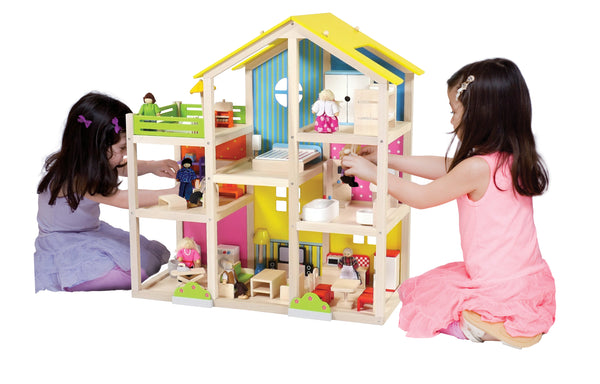Pretend Play - fueling your child's imagination
Posted on February 19 2019

Pretend play, role play, imaginative play, symbolic play, make-believe… it has many terms but the underlying benefits for child development are the same. So then what does it mean? The art of skillfully imitating an object or character; the child in context assumes the role of the person or object he is pretending to be. For example, imagining to play mummy or daddy, a parent and even caring for a teddy or doll as a child.
Now, pay attention to the things they say or do when assuming a role; it is almost always inspired by the communication patterns around them. I know, it is absolutely mind-boggling to think that every single thing that we say in front of them or to them, directly, plays a role in shaping who they are and how they interpret the world.
Pretend play is a thinking skill. To pretend in play, the child has to understand the setup and associate the appropriate behavior. For example, “the windows are too dirty, let me clean it, mommy.” Playing a particular character during roleplay requires the child to learn and comprehend what the person is doing or saying. Group role play sessions are even more challenging and stimulating for the young ones. When a young child continues this play in a group - each child plays a certain role and begins interacting in their given new avatar and takes on responsibilities to fulfill that very part.
Symbolic play aids child development as they learn various skills such as listening, sharing, negotiation, taking turns and respecting personal space and individual thoughts & ideas amongst other social skills.

Children learn by imagining and doing. The most liberating act we as caretakers can provide for - is a platform to be whoever they want to be. Pretend play enables the same. The process of pretending builds skills in many essential developmental areas.
- Language skills:
Whenever you hear children indulge in imaginative play, notice the way they speak. Where did they learn how to be a vegetable vendor, a doctor or a chef from? These assumed roles, the demeanor and the dialect - it is all so natural! Of course, it is because they hear the adults, teachers and everyone around them converse. They listen and then apply. This helps them understand how to effectively communicate with others and builds their language skills - including, the difference between spoken language and written.
- Social and Emotional skills:
When a child interacts with those around him it builds his social and emotional skills as he is required to listen and communicate, compromise and sympathize. When they play the role of a character, it helps them be empathetic. This is important, as humans can view the world from their very convenient viewpoint but when they assume roles, they are forced to look at it from another lense. This enables cooperation, maturing and building self-esteem. For example, sharing their toys with a fellow young one.

- Boosting Creativity and Imagination:
Imagining to be somebody! Oh, the world is a plethora of options for that. A young one will and can choose to play anybody. This not only boosts brain development but also aids creative thinking and problem-solving. An example for this one would be assuming a bowl to be snow-whites pumpkin. They go above and beyond and find a solution to the missing piece.
- Aids Critical Thinking:
Pretend play and talk requires the child to make a decision and optimize cognitive thinking skills. Whether it is thinking of a unique way to use an object or splitting responsibilities as role play parents, these skills will always help them grow.
To pretend in play, the child has to understand the setup and associate the appropriate behavior. For example, “the windows are too dirty, let me clean it, mommy.” Playing a particular character during roleplay requires the child to learn and comprehend what the person is doing or saying. It is an exercise that will help them grow and best understand responsibilities and life skills. The best way to comprehend is to get your hands dirty in the act and symbolic play gives a child that very important exposure.
As we watch them clean spotless spaces, converse with imaginary characters and play doctor to a teddy - I hope we can always see the growth in their play. Therefore, making learning a joyride!
